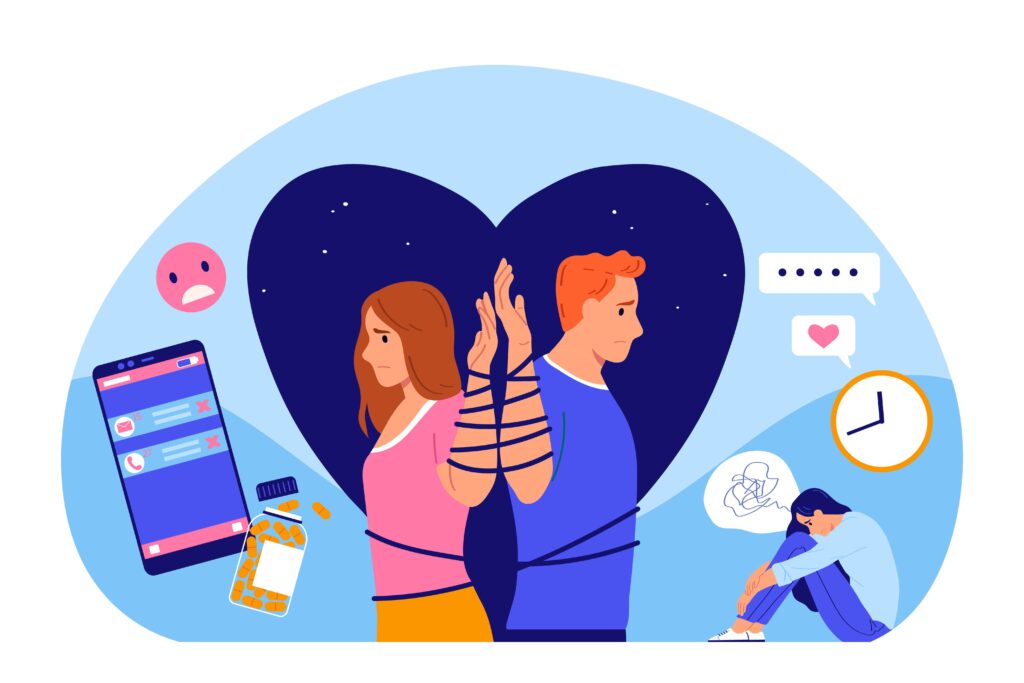The AI Effect on Love: Building Stronger Bonds or Fake Connections? Explore how AI transforms modern relationships—enhancing romance, deepening emotional bonds, or creating artificial connections. Discover the benefits, risks, and future of AI in love. 🚀 #AI #Love #Relationships
In the digital age, artificial intelligence (AI) has permeated nearly every aspect of our lives, from the way we work to how we communicate.
But perhaps one of the most intriguing and controversial areas where AI is making its mark is in the realm of love and relationships.

The question on many minds is whether AI is helping us build stronger, more meaningful connections or if it’s fostering superficial, fake relationships.
This article delves deep into the AI effect on love, exploring how technology is reshaping the way we connect, communicate, and even fall in love.
We’ll examine the potential benefits and pitfalls of AI in relationships, and consider whether these digital advancements are bringing us closer together or driving us further apart.
The Rise of AI in Relationships:

AI-Powered Dating Apps:
The most obvious way AI has infiltrated the world of love is through dating apps. Platforms like Tinder, Bumble, and Hinge are increasingly using AI algorithms to match users based on compatibility.
These algorithms analyze vast amounts of data, from your swiping patterns to your messaging habits, to predict who you’re most likely to connect with.
Pros:
- Efficiency: AI can quickly sift through thousands of profiles to find potential matches, saving users time and effort.
- Personalization: By learning from your behavior, AI can offer more tailored suggestions, increasing the likelihood of a successful match.
- Accessibility: Dating apps make it easier for people to meet others outside their immediate social circles, broadening the dating pool.
Cons:
- Superficiality: Critics argue that AI-driven dating apps prioritize physical appearance and superficial traits over deeper compatibility.
- Privacy Concerns: The vast amount of personal data collected by these apps raises concerns about privacy and data security.
- Over-Reliance on Technology: Some worry that relying too heavily on AI for matchmaking could lead to a decline in organic, real-world connections.
Virtual Companions and AI Chatbots:
Beyond dating apps, AI is also being used to create virtual companions and chatbots designed to provide emotional support and companionship.

These AI entities can engage in conversations, offer advice, and even simulate emotional responses.
Pros:
- Emotional Support: For individuals who are lonely or isolated, AI companions can provide a sense of connection and comfort.
- Accessibility: AI chatbots are available 24/7, offering immediate support whenever it’s needed.
- Non-Judgmental: Unlike human interactions, AI companions are free from judgment, allowing users to express themselves freely.
Cons:
- Lack of Genuine Emotion: While AI can simulate emotions, it lacks the depth and authenticity of human feelings, potentially leading to shallow connections.
- Dependency: There’s a risk that users could become overly reliant on AI for emotional support, potentially hindering their ability to form real-world relationships.
- Ethical Concerns: The development of AI companions raises ethical questions about the nature of relationships and the potential for exploitation.
AI and Communication in Relationships:

Enhancing Communication:
AI is also playing a role in enhancing communication between partners. Tools like AI-powered language translation apps are breaking down language barriers, allowing people from different linguistic backgrounds to connect more easily.
Additionally, AI-driven communication platforms can analyze text and voice messages to provide insights into emotional tone and sentiment, helping partners better understand each other.
Pros:
- Breaking Barriers: AI translation tools enable cross-cultural relationships by facilitating communication between people who speak different languages.
- Emotional Insight: AI can help partners better understand each other’s emotions, potentially reducing misunderstandings and conflicts.
- Convenience: AI-driven communication tools can make it easier for couples to stay connected, even when they’re apart.
Cons:
- Loss of Nuance: While AI can translate words, it may struggle to capture the nuances and cultural context of language, potentially leading to misunderstandings.
- Over-Reliance on Technology: Relying too heavily on AI for communication could diminish the importance of face-to-face interactions and non-verbal cues.
- Privacy Risks: The use of AI in communication raises concerns about data privacy and the potential for misuse of personal information.
The Role of AI in Conflict Resolution:
AI is also being explored as a tool for conflict resolution in relationships. Some platforms use AI to analyze communication patterns and identify potential sources of conflict, offering suggestions for addressing issues before they escalate.

Pros:
- Proactive Problem-Solving: AI can help couples identify and address potential conflicts early, potentially preventing larger issues.
- Objective Analysis: AI can provide an unbiased perspective on conflicts, helping partners see things differently.
- Educational Resources: Some AI platforms offer resources and advice on how to improve communication and resolve conflicts effectively.
Cons:
- Lack of Human Touch: While AI can offer suggestions, it lacks the empathy and understanding that a human mediator might provide.
- Over-Simplification: AI may oversimplify complex emotional issues, potentially leading to ineffective or inappropriate solutions.
- Dependency: Relying on AI for conflict resolution could hinder couples’ ability to develop their problem-solving skills.
The Impact of AI on Intimacy:

AI and Sexual Relationships:
AI is also making its way into the bedroom, with the development of AI-powered sex toys and virtual reality (VR) experiences designed to enhance sexual intimacy.
These technologies aim to provide new and exciting ways for couples to connect physically.
Pros:
- Innovation: AI-powered sex toys and VR experiences can add novelty and excitement to a couple’s sex life.
- Exploration: These technologies can help couples explore new aspects of their sexuality in a safe and consensual manner.
- Accessibility: For individuals with physical limitations or those in long-distance relationships, AI-enhanced intimacy can provide new ways to connect.
Cons:
- Objectification: There’s a risk that AI-enhanced sexual experiences could lead to the objectification of partners, reducing intimacy to a purely physical act.
- Dependency: Over-reliance on AI for sexual satisfaction could hinder couples’ ability to connect on a deeper emotional level.
- Ethical Concerns: The use of AI in sexual relationships raises ethical questions about consent, privacy, and the potential for misuse.
Emotional Intimacy and AI:
Beyond physical intimacy, AI is also being used to enhance emotional intimacy in relationships. Some platforms use AI to analyze couples’ communication patterns and provide insights into their emotional connection, offering suggestions for how to strengthen their bond.

Pros:
- Enhanced Understanding: AI can help couples gain a deeper understanding of each other’s emotional needs and preferences.
- Personalized Advice: AI-driven platforms can offer tailored advice on how to improve emotional intimacy, based on the unique dynamics of each relationship.
- Convenience: AI tools can make it easier for couples to work on their emotional connection, even when they’re busy or apart.
Cons:
- Lack of Authenticity: While AI can offer insights, it may lack the authenticity and depth of human emotional understanding.
- Over-Reliance on Technology: Relying too heavily on AI for emotional intimacy could hinder couples’ ability to connect on a genuine, human level.
- Privacy Risks: The use of AI to analyze emotional communication raises concerns about data privacy and the potential for misuse of personal information.
The Ethical and Psychological Implications of AI in Love:

Ethical Considerations:
The integration of AI into love and relationships raises a host of ethical questions. For example, who owns the data collected by AI-driven dating apps and communication platforms?
How is this data being used, and what are the potential risks of misuse? Additionally, there are concerns about the potential for AI to perpetuate biases and inequalities in relationships, particularly if algorithms are trained on biased data.
Key Ethical Issues:
- Data Privacy: The vast amount of personal data collected by AI platforms raises concerns about privacy and the potential for misuse.
- Bias and Discrimination: AI algorithms can perpetuate biases if they’re trained on biased data, potentially leading to unfair or discriminatory outcomes.
- Consent: The use of AI in relationships raises questions about consent, particularly when it comes to AI-enhanced intimacy and emotional support.
Psychological Implications:
The psychological impact of AI on love and relationships is another area of concern. While AI has the potential to enhance connections, there’s also a risk that it could lead to a decline in genuine, human relationships.

For example, individuals who rely heavily on AI for emotional support may struggle to form deep, meaningful connections with real people.
Key Psychological Concerns:
- Isolation: Over-reliance on AI for companionship could lead to social isolation and a decline in real-world relationships.
- Emotional Dependency: There’s a risk that individuals could become emotionally dependent on AI, potentially hindering their ability to form healthy, human relationships.
- Authenticity: AI lacks the authenticity and depth of human emotions, potentially leading to shallow or superficial connections.
The Future of AI in Love and Relationships:

Potential Developments:
As AI technology continues to advance, its role in love and relationships is likely to evolve.
Future developments could include more sophisticated AI companions, enhanced virtual reality experiences, and even AI-driven relationship coaching.
Additionally, AI could play a role in addressing global challenges in relationships, such as long-distance communication and cross-cultural understanding.
Potential Future Applications:
- Advanced AI Companions: Future AI companions could become even more sophisticated, offering deeper emotional support and more realistic interactions.
- Enhanced VR Experiences: Virtual reality technology could be used to create more immersive and realistic experiences for couples, particularly those in long-distance relationships.
- AI-Driven Relationship Coaching: AI could be used to provide personalized relationship coaching, helping couples navigate challenges and strengthen their bond.
Balancing Technology and Humanity:
As we move forward, it’s crucial to strike a balance between the benefits of AI and the importance of genuine, human connections.
While AI has the potential to enhance relationships, it should never replace the authenticity and depth of human emotion.
By using AI as a tool to complement, rather than replace, human interactions, we can harness its potential to build stronger, more meaningful bonds.
Key Considerations for the Future:
- Ethical Development: It’s essential to develop AI technologies ethically, with a focus on privacy, consent, and fairness.
- Human-Centered Design: AI should be designed with the user in mind, prioritizing the enhancement of human relationships rather than replacing them.
- Education and Awareness: As AI becomes more integrated into our lives, it’s important to educate users about its potential benefits and risks, empowering them to make informed decisions.
The AI Effect on Love: Building Stronger Bonds or Fake Connections?
FAQs: The AI Effect on Love and Relationships
As AI continues to shape the way we connect and communicate, many questions arise about its role in love and relationships.

Below are some frequently asked questions (FAQs) to help you better understand the impact of AI on modern romance.
Q1. How does AI influence modern dating apps?
A1: AI plays a significant role in modern dating apps by using algorithms to analyze user behavior, preferences, and interactions.
These algorithms suggest potential matches based on compatibility, swiping patterns, and shared interests.
AI also helps improve user experience by filtering out irrelevant profiles and reducing the time it takes to find a match.
Q2. Are AI-powered relationships authentic or fake?
A2: This is a debated topic. AI can help foster connections by breaking down barriers like distance or language, but some argue that relationships mediated by AI may lack the depth and authenticity of organic, human interactions.
The authenticity of a relationship ultimately depends on how individuals use AI—as a tool to enhance connection or as a substitute for genuine emotional engagement.
Q3. How does AI impact long-distance relationships?
A3: AI can be a game-changer for long-distance relationships. Tools like AI-powered translation apps, sentiment analysis, and virtual reality experiences help bridge the gap by facilitating communication and creating immersive shared experiences.
However, it’s important to balance AI tools with genuine, heartfelt interactions to maintain a strong emotional connection.
Q4. What are the ethical concerns surrounding AI in relationships?
A4: Key ethical concerns include:
- Data Privacy: AI platforms collect vast amounts of personal data, raising questions about how this information is stored and used.
- Bias and Discrimination: AI algorithms may perpetuate biases if trained on biased data, leading to unfair outcomes.
- Consent: The use of AI in intimate or emotional contexts raises questions about informed consent and the potential for exploitation.
Q5. Can AI help resolve conflicts in relationships?
A5: Yes, AI can assist in conflict resolution by analyzing communication patterns and identifying potential sources of tension.
Some platforms offer suggestions for addressing issues before they escalate. However, AI lacks the empathy and nuanced understanding of a human mediator, so it should be used as a supplementary tool rather than a replacement for open, honest communication.
Conclusion:
The AI effect on love is a complex and multifaceted issue, with the potential to both enhance and hinder our relationships.
On one hand, AI offers exciting new possibilities for connection, communication, and intimacy. On the other hand, there are legitimate concerns about privacy, authenticity, and the potential for over-reliance on technology.
As we navigate this brave new world of AI-driven love, it’s essential to approach these technologies with a critical eye and a focus on ethical, human-centered design.
By doing so, we can harness the power of AI to build stronger, more meaningful bonds, while preserving the authenticity and depth of human connection that makes love so special.
In the end, the key to a successful relationship—whether aided by AI or not—lies in genuine communication, empathy, and a commitment to understanding and supporting one another.
As we continue to explore the possibilities of AI in love, let’s not forget the importance of the human heart at the center of it all.
Other Interesting Posts To Read:
Is AI the Future of Love or the End of Real Relationships?
The Future of Love: Is AI Helping or Hurting Relationships?
The #1 Mistake Couples Make That Leads to Resentment
10-Second Relationship Rule: Simple Trick to Strengthen Your Bond Instantly


